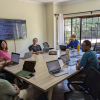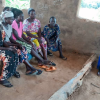Policing in Africa: exploring the diversity of plural and hybrid security providers
Policing by multiple actors is not new in Africa but has always been a part of society. The main challenge is the lack of an overarching authority, as argued by Etannibi Alemika from the University of Jos in Nigeria. He addressed this issue at the event ‘Plural Security in the City’, which was organized by the University of Amsterdam, the Conflict Research Unit of Clingendael Institute and the Knowledge Platform Security & Rule of Law in Amsterdam on 22 October.

Plural policing is not alien to African societies. It has always been their lived experience. Policing in traditional African societies was the responsibility of an array of agencies, institutions and occupations such as age-based groups, the elders, hunters, priests, cultural and religious groups and fraternities. Contemporary challenges of conflicts, insecurity and ineffectiveness of state police and other security agencies in Africa has led to the resurgence and adaptation of traditional policing mechanisms and strategies in modified forms by communal, ethnic and religious vigilante groupsto guarantee security.
Contemporary police forces were a colonial creation. They were established during the colonial era as instruments of colonial pacification, domination and exploitation. Prior to colonial rule, many African societies evolved the political system with dominant ruling dynasties that maintained personnel that performed both policing functions. In many societies without such ruling dynasties, communal self-policing was predominant. Colonial rule did not supersede and replace community self-policing in Africa. In many cases, it was rationalized and brought under the control of local authorities that were appended to colonial rule while in other, especially in distant rural areas, it was left undisturbed.
Africa has recorded an increasing diversity of policing structures and networking among them. The emergent policing structure in Africa is characterized by increasing plurality of state and non-state providers, hybrid of public and private providers, devolution of policing services across levels of government and the public and private divides, and tolerance of community-based providers of policing by public policing agencies.
Communities across Africa continue to use diverse policing and dispute resolution mechanisms. The choice of mechanism is dictated by ease of access, affordability and cultural prescription of how and who to resolve certain conflicts between designated groups of people, such as family members. The developments in policing in Africa pose challenges around governance embodying authorization and regulation, resource mobilization, service provision or delivery, coordination, and accountability. The problem with plural policing in Africa is that there is no overarching authority that drives and controls the various actors.
Community-based policing groups
There has been a rapid increase in community-based policing initiatives in Africa over the past four decades. This development may be attributed to several factors:
- First, democratization and liberalization provided an atmosphere in which community self-policing could take place without repression. This was the case during the previous era of either military rule or single party rule.
- Secondly, in many countries including Nigeria democratization was accompanied by an upsurge of conflict and violence between ethnic and religious groups, which resulted in the formation of non-state militias.
- Thirdly, protracted military rule and authoritarian single party regimes did not equip the police for democratic policing, and especially effective crime prevention and control, as much as the defence of the regime and its personnel. Therefore with democratization, the police were not able to provide effective security in the midst of challenging socioeconomic problems created by political contentions and neoliberal economic adjustment programmes that were adopted along with democratization. In the face of ineffective law enforcement agencies, communities introduced self-policing in the form of vigilante groups.
- Lastly, democratization and adoption of neoliberal economic programmes created opportunities for the expansion of commercial private security. In some African countries such as Nigeria, South Africa, Kenya, Uganda and Ghana, retired security personnel seized the opportunity and established commercial security firms in providing guards and other services to their clients.
Public police reforms
Public policing has also witnessed reforms, expansion and pluralism over the past four decades since the wave of neoliberal political and economic reforms. The development has been in five directions:
- There have been attempts to reform the police services in many African countries, especially Nigeria, South Africa, Kenya and post-conflict countries such as Liberia and Sierra Leone. The reforms include emphasis on accountability, which led to the establishment of expansive oversight agencies in South Africa, Kenya and Nigeria.
- Several countries have also established specialized police authorities with limited jurisdictions such as drugs, traffic, environment and sanitation, wildlife and conservation and environment, corruption and money laundering, and organized crime. This development has nonetheless created challenges of governance of the emerging policing architecture in respect to equipping, cooperation and coordination.
- There has been an increasing demand and attempt to devolve policing to lower tiers of government and community. This development can be attributed to the promotion of the goals and practices of community policing by donors and local human rights NGOs. The emerging scenario from this is a diminishing opposition by security forces to unarmed community-based policing groups.
- There is also increasing government support for community-based vigilante groups that operate in crime-endemic communities.
- Another development is the emergence of regional associations of police chiefs in West, East and Southern Africa.
|
Join the conversation This blog post is part of an online continuation of the conversation started at the event ‘Plural Security in the City’, held on 22 October 2015 in Amsterdam. The Platform and The Broker are organizing a series of online blog posts on this topic, in order to inform the Platform’s broader network about the discussions that have taken place during the event, and to invite you to join the conversation. |
Photo credit: An elder listens to a land dispute between community members / Overseas Development Institute via Flickr






Login or register for free to get all access to our network publications. Members can also connect and discuss with other members. Participate in our network.